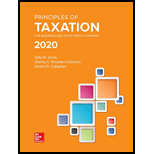
For the past 12 years, George Link has operated his appliance repair business out of a 1,000-square-foot, ground floor office in a four-story commercial building called 129 Main. Last year, George signed a five-year lease with Kramer Management, the owner of 129 Main. This year, Kramer decided to convert the building into condominiums and is negotiating with all its tenants to surrender their leasehold rights and vacate their space in 129 Main. Kramer has offered George a $50,000 cash payment and the use of a 1,200-square-foot office in a new shopping center recently constructed by Kramer. If George accepts Kramer’s offer, he can use the new office rent free for 36 months. The fair rental value of this office is $1,300 per month. What are the tax consequences to George if he accepts Kramer’s offer and moves his business location?
Want to see the full answer?
Check out a sample textbook solution
Chapter 8 Solutions
Principles of Taxation for Business and Investment Planning 2020 Edition
- For the purposes of the 20x0 annual financial statements, how would the additional shares of Series A preferred stock issued from Company Y to Company Y's original investor on November 1 20X0 affect the measurment of the company Y's series A preferred stock purchased on may 1, 20x0?arrow_forwardGeneral Accountingarrow_forwardFinancial Accounting Questionarrow_forward
- What is the investment turnover for this financial accounting question?arrow_forwardSuppose you take out a five-year car loan for $14000, paying an annual interest rate of 4%. You make monthly payments of $258 for this loan. Complete the table below as you pay off the loan. Months Amount still owed 4% Interest on amount still owed (Remember to divide by 12 for monthly interest) Amount of monthly payment that goes toward paying off the loan (after paying interest) 0 14000 1 2 3 + LO 5 6 7 8 9 10 10 11 12 What is the total amount paid in interest over this first year of the loan?arrow_forwardSuppose you take out a five-year car loan for $12000, paying an annual interest rate of 3%. You make monthly payments of $216 for this loan. mocars Getting started (month 0): Here is how the process works. When you buy the car, right at month 0, you owe the full $12000. Applying the 3% interest to this (3% is "3 per $100" or "0.03 per $1"), you would owe 0.03*$12000 = $360 for the year. Since this is a monthly loan, we divide this by 12 to find the interest payment of $30 for the month. You pay $216 for the month, so $30 of your payment goes toward interest (and is never seen again...), and (216-30) = $186 pays down your loan. (Month 1): You just paid down $186 off your loan, so you now owe $11814 for the car. Using a similar process, you would owe 0.03* $11814 = $354.42 for the year, so (dividing by 12), you owe $29.54 in interest for the month. This means that of your $216 monthly payment, $29.54 goes toward interest and $186.46 pays down your loan. The values from above are included…arrow_forward
- Suppose you have an investment account that earns an annual 9% interest rate, compounded monthly. It took $500 to open the account, so your opening balance is $500. You choose to make fixed monthly payments of $230 to the account each month. Complete the table below to track your savings growth. Months Amount in account (Principal) 9% Interest gained (Remember to divide by 12 for monthly interest) Monthly Payment 1 2 3 $500 $230 $230 $230 $230 + $230 $230 10 6 $230 $230 8 9 $230 $230 10 $230 11 $230 12 What is the total amount gained in interest over this first year of this investment plan?arrow_forwardGiven correct answer general Accounting questionarrow_forwardFinancial accounting questionarrow_forward
 Individual Income TaxesAccountingISBN:9780357109731Author:HoffmanPublisher:CENGAGE LEARNING - CONSIGNMENT
Individual Income TaxesAccountingISBN:9780357109731Author:HoffmanPublisher:CENGAGE LEARNING - CONSIGNMENT





